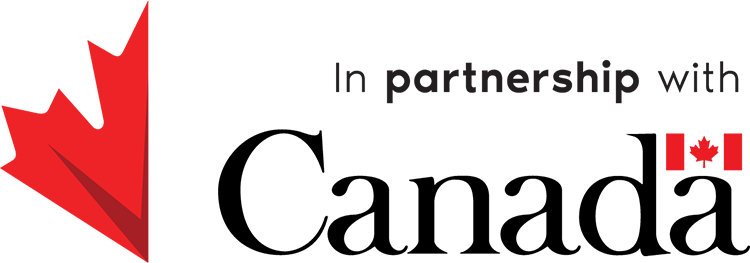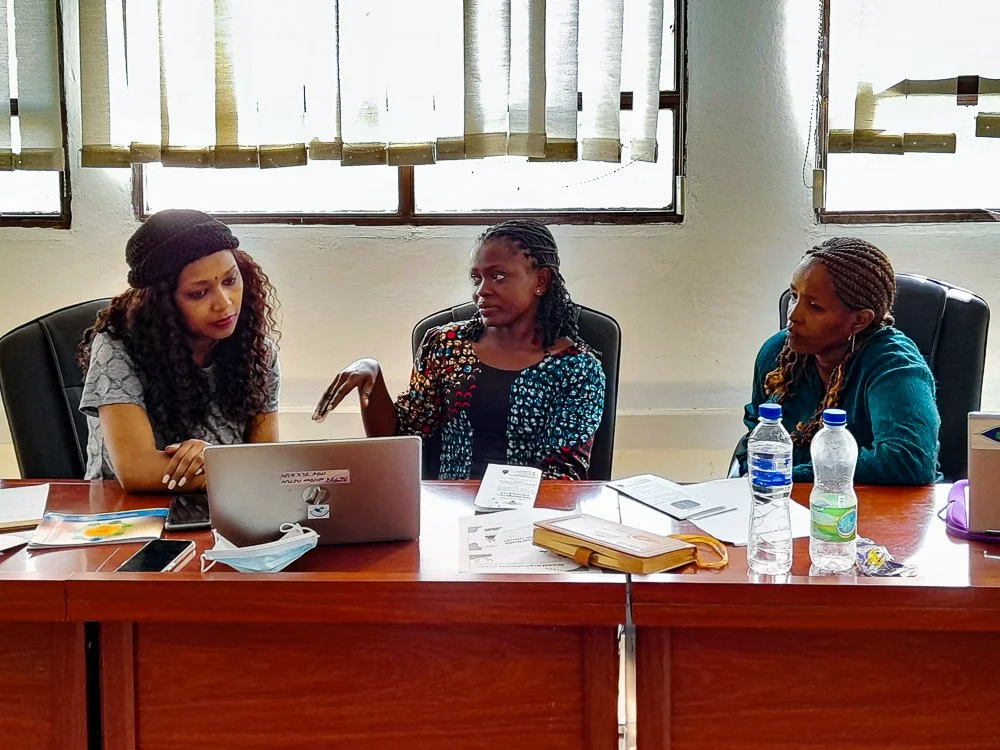Exciting final update on our menstrual health workshop series!
As our workshop series comes to a close, I'm excited to share my final update with you. It's been an incredible journey and I'm excited to highlight the outcomes from our workshop, Integrating Menstrual Health and Hygiene (MHH) into Behaviour Change Programs, delivered in partnership with the Ethiopian Kale Heywet Church Development Commission (EKHCDC) and the Government of Canada.
Demonstrating different menstrual hygiene management (MHM) options such as tampons and menstrual cups with Aster Tumancho, Meseret Alemayehu, Adanech Tadese and Firehiwot Tefera (at the back is Abiy Gezahegn, our water quality specialist at head office, who is eager to see the practice)
During the workshop, we focused on better understanding the community-specific resource needs that aligned with local cultural contexts. By understanding and respecting local norms and traditions, we are able to create materials that are both relevant and effective. This approach ensures that our resources will be well-received and impactful, fostering greater acceptance and understanding of menstrual health issues.
Our goal was to use the information we all learned during the workshop and apply it to the next phase, which is to then create resources. These will be not only informative, but also resonate deeply with the unique norms, traditions and acceptability of each community we engage with, and I believe that we are making progress.
In addition to community-specific resources, we also worked on developing a range of information, education and communication (IEC) materials. These included posters, brochures and simple graphics designed to be easily shared via platforms like WhatsApp and Telegram. By leveraging these widely-used communication channels, we ensured our messages reached a broader audience, spreading awareness and education more effectively.
Furthermore, these IEC materials will be housed within MHH resource centres at our project schools, ensuring more people are reached through this work! These centres will serve as hubs for accessing vital information, promoting continuous learning and fostering a supportive environment for discussing menstrual health.
Team members from EKHCDC and the Maji Safi Group, Ruhama, Anuciata and Mulu working together to develop IEC materials
Our collaboration efforts in this project extend beyond individual communities to create a global community of practice for MHH. We are facilitating inclusive knowledge exchange, enabling countries and communities in the Global South to share their experiences, insights and best practices with each other. This exchange not only enriches our collective knowledge but also strengthens our global network, making it more robust and capable of driving meaningful change.
“It was an honour to be part of this workshop. I am hopeful for the future and the impact these new MHH materials will bring to further educate and strengthen the exchange of new knowledge and ideas in our community,” said Ruhama.
We are pleased to support our partners in their MHH initiatives and facilitate the collaborative spirit that fuels our initiatives. By developing community-specific resources, utilizing innovative IEC materials and fostering a global community of practice, we aim to improve MHH for women and girls around the world.
Thank you for your continued support. Together, we are creating a world where menstrual health is prioritized, understood and supported.
Karen Joe joined the Research and Learning team as a Knowledge and Research Advisor in November 2019. She holds a master’s degree in International Public Health from the University of Queensland and a Bachelor of Science from the University of Western Ontario. Karen has over 10 years of experience in international development and public health, specializing in knowledge management, program design, gender equality and social inclusion, monitoring and evaluation, and results-based management. She is an experienced evaluator and has worked across Sub-Saharan African and the South Pacific regions. Prior to joining CAWST, she worked at the University of Calgary, coordinating the Tanzania Maternal, Newborn and Child Health Initiative (Mama na Mtoto). She has previously lived in both Nigeria and Ghana where she worked on Global Affairs Canada funded Maternal and Child health programs.

This blog is a republished version of our Global Notebook e-series. Be the first to get an exclusive inside look into our work abroad and feel like you're there alongside us. Subscribe to Global Notebook to get real-time updates straight into your inbox and hear our stories before anyone else. Travel with CAWST’s Global Advisors as they bring water and sanitation to communities around the world. Subscribe now.


